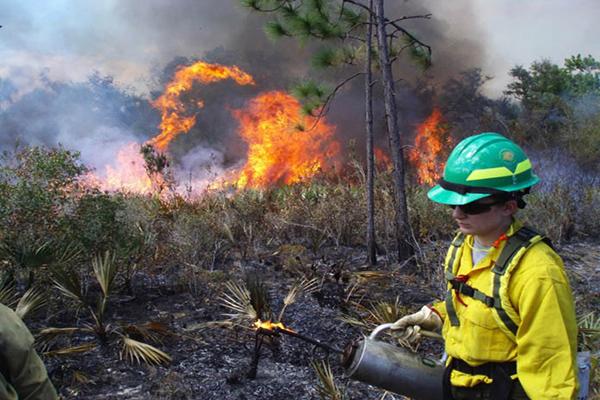The wildland firefighting program at NMU began offering a minor and a certificate at the beginning of this semester, but has been offering classes since 2001.Since the start of the program, the classes have been very popular, according to contingent instructor Jeff Noble.

“The first year we offered the class, it filled in about an hour,” Noble said. “We offered a second section the next year and both sections filled in an hour.”
After the initial success, the wildland firefighting program began offering a class that travels to Florida to improve habitats using fire.
“After about four or five years, through partnerships with other agencies, we developed a class during spring break called Wildland Fire Crew,” Noble said. “That’s the crew that goes to Florida during spring break and they work in conjunction with Florida Park service, Florida Division of Forestry, and universities in Florida.
“What the students do is during their spring break they go down there and work with those agencies to help perform prescribed burns.”
The Health, Physical Education and Recreation (HPER) department encompasses the wildland fire program.
According to Noble, HPER has been very supportive of the expanding program, which has maintained its popularity.
“At one point in time, we realized that there are enough students interested in it and there’s enough demand for it that a minor would make good sense,” Noble said. “Students would come out with a minor not just one or two credits or three or four credits but with a big bunch of credits and it would look really attractive to an employment agency.”
The wildland fire minor is 23 credits. The certificate consists of the same classes as the minor, plus eight electives in subjects such as meteorology, geology and biology.
Once a student completes a course, which includes demonstrating the material learned, they are certified in those skills through the National Wildfire Coordinating Group (NWCG), which sets the standards across the nation for what a wildland firefighter should know.
According to Noble, Northern is the only university in the United States to offer college credit for NWCG certifications, which makes students valuable to possible employers across the nation.
The hands-on experience in the classes are successful in preparing students for jobs, especially seasonal work, according to senior environmental science major Mary Vander Sluis.
Vander Sluis has been taking wildland fire classes for three years and picked up the minor this year. In summer 2012, she spent more time working on the Duck Lake fire in Newberry, Mich. than any other temporary employee.
“I gained a lot of experience so that was really cool to have that experience because normally first time firefighters find it hard to gain experience so that was a really cool fire to be on,” Vander Sluis said. “Especially working with all the DNR employees that have been in fire for so many years.”
Vander Sluis also said the class that goes to Florida is especially helpful for building connections within the fire community and getting hands-on experience.
“That class really paints a picture to a student of ‘if I would get a job in wildland firefighting, this is what I would be doing every day,’” Vander Sluis said. “So it’s not a glamorous, luxury spring break vacation, but it really helps students decide ‘is this something that I can see myself doing?’”
According to Assistant Provost for Undergraduate Programming and Faculty Affairs Dale Kapla, new minors start from the department and take about a year to finalize.
The only other new minor this year is a concentration of actuarial science in the mathematics major.
























